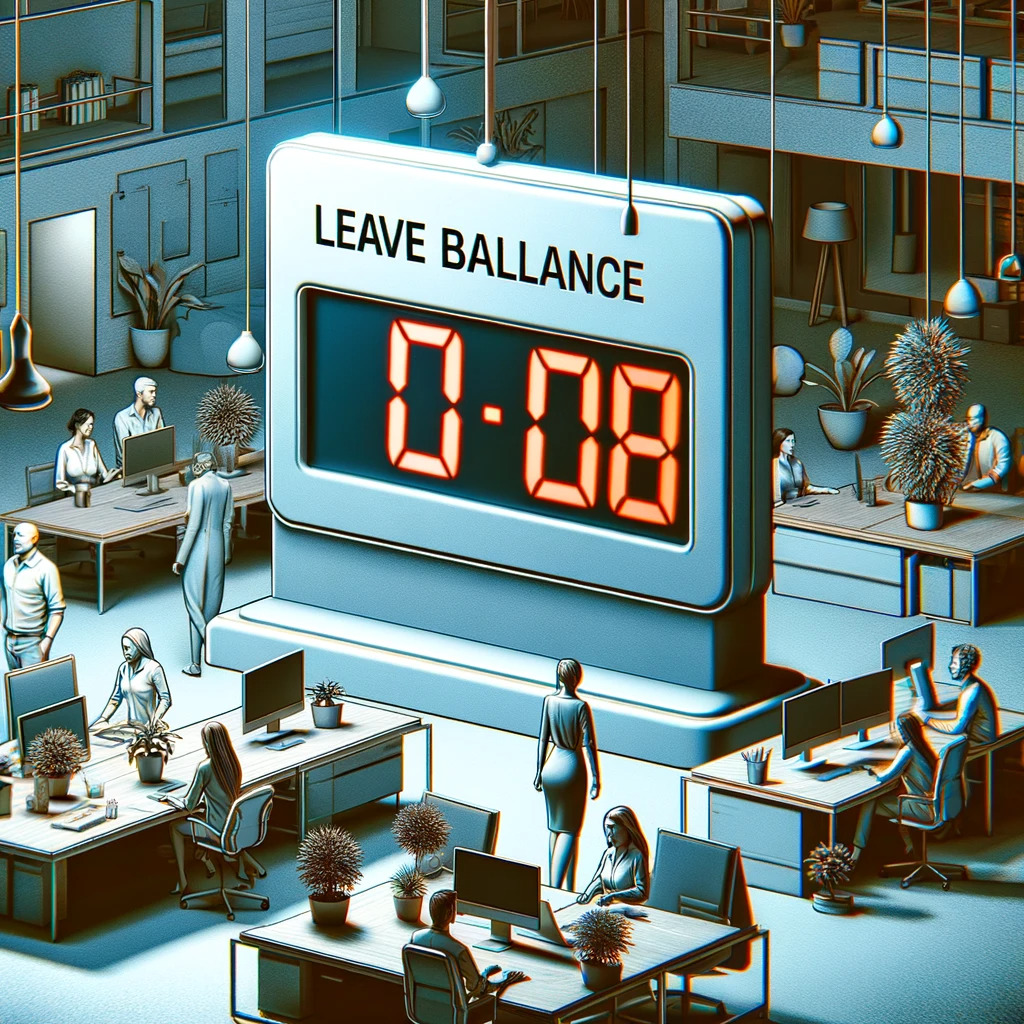Conflict at work is inevitable whenever smart, motivated people care about results. The question isn’t how to avoid conflict, it’s how to channel it into clarity, trust, and better decisions. Effective resolution blends structure (clear steps, roles, and documentation) with care (psychological safety, fair process, humane pacing). Strategic use of a brief day off for reflection and cool-down can lower emotions enough to make the hard conversation productive, so long as it’s paired with a concrete plan to talk, agree, and follow through. Just as important, tie this practice to your PTO policy: make clear that taking earned PTO (including protected sick or wellness time) is never penalized, encourage proactive scheduling and transparent handoffs via your PTO tracker, and ensure managers help employees use time off to recover after high-stress cycles so performance is sustainable, not sacrificial.
Recognizing the Conflict
Why this matters: Unseen or minimized conflict leaks morale and productivity. Small misunderstandings calcify into narratives (“they never listen”), and those narratives quietly drive attrition.
What “good” looks like: You name the tension early, neutrally, and without blame: “I’m noticing friction around sprint priorities, let’s unpack it.” You invite all parties, clarify that the goal is shared problem-solving, and timebox the process.
Where a day off helps: If emotions are running hot, raised voices, tight deadlines, repeated interruptions, offer a same- or next-day pause with a scheduled reconvene. The day off is not avoidance; it’s a tactical reset: “Let’s take tomorrow to cool down and meet Thursday at 10 a.m. with notes on desired outcomes.”
Pitfalls to avoid: Don’t pretend nothing happened, and don’t use PTO to push issues into the future. Without a booked follow-up, time away becomes procrastination.
Understanding the Conflict
Why this matters: You solve different problems differently. Interpersonal friction (communication style) isn’t the same as resource contention (two teams, one engineer) or goal misalignment (KPIs pulling in opposite directions).
How to do it well: Gather short, separate perspectives from each party: what happened, what they need, what “better” would look like. Look for root causes: unclear roles, competing incentives, missing decision rights. Translate feelings into needs (“I feel sidelined” → “I need earlier input on scope”).
Where a day off helps: Ask each person to spend an hour of their day off capturing facts, impacts, and proposals in writing. Reflection reduces bias and helps people arrive with a calm, coherent story.
Pitfalls to avoid: Don’t diagnose from one vantage point. Don’t reduce structural issues to personalities, if incentives fight, people will too.
Creating a Safe Environment
Why this matters: People can’t reason while defending. Safety makes space for candor, which makes space for solutions.
What “good” looks like: A private, neutral setting; clear ground rules (one person speaks at a time, assume positive intent, focus on behaviors and impacts); and a facilitator who keeps the conversation balanced and forward-looking.
Where a day off helps: When tensions are acute, schedule the meeting for the morning after a day off. People show up more rested, less reactive, and more able to listen.
Pitfalls to avoid: Don’t convene in public channels or surprise people on a live call. Give time to prepare.
Active Listening
Why this matters: Being heard dissolves defensiveness. It also improves data quality, misunderstandings often evaporate when people restate each other’s points.
How to do it well: Use short, reflective summaries (“What I’m hearing is… Did I get that right?”), ask clarifying questions, and separate intent from impact. Track agreements and open questions in a shared note.
Where a day off helps: After an emotionally heavy session, a short day off helps people process without escalating in chat threads. Set expectations: no post-mortems on Slack; we’ll reconvene with reflections.
Pitfalls to avoid: Don’t rebut mid-story. Don’t rush to solutions before you’ve accurately mirrored both perspectives.
Identifying Common Ground
Why this matters: Shared aims reduce zero-sum thinking and open the door to creative trades.
How to do it well: Name explicit overlaps: “Both of you want an on-time launch and fewer escalations.” Convert that into criteria for solutions (on-time, quality thresholds, reasonable load). Agreement on criteria narrows option space productively.
Where a day off helps: Ask each person to propose two solutions that meet the shared criteria during their day off. Coming back with options, rather than positions, makes compromise easier.
Pitfalls to avoid: Don’t force kumbaya. Common ground is a tool, not a denial of real differences.
Collaborative Problem-Solving
Why this matters: People support what they help create. Jointly designed solutions stick longer and require less policing.
How to do it well: Brainstorm options, evaluate against the agreed criteria, and converge on a plan with owners, milestones, and safeguards. Write it down in plain language so there’s no daylight between memory and intent.
Where a day off helps: For gnarly problems, schedule a day off after the brainstorm. Ask folks to test the preferred plan against edge cases and come back with risks and mitigations.
Pitfalls to avoid: Don’t let the highest title decide by default. Don’t leave with fuzzy responsibilities.
Implementing and Following Up
Why this matters: Resolution isn’t the meeting, it’s the new behavior over time. Without follow-through, cynicism grows.
How to do it well: Translate agreements into a lightweight action plan: who does what, by when, and how success will be measured. Book two check-ins: a quick one in a week to catch snags, and a deeper one in a month to assess outcomes.
Where a day off helps: If the plan demands intense effort or a big mindset shift, consider a day off right before launch to reset energy and avoid knee-jerk resistance.
Pitfalls to avoid: Don’t assume goodwill replaces systems. Put changes into calendars, docs, and dashboards.
Offering Support
Why this matters: Conflict can reveal skill gaps (feedback delivery, negotiation) or systemic issues (unclear RACI, brittle processes). Support turns the episode into growth.
How to do it well: Offer coaching, mentoring, training, or a neutral HR/ER partner. Adjust structures that created friction, decision rights, review gates, handoff templates. Support both performance and wellbeing.
Where a day off helps: Encourage a recovery day if the process was particularly intense, or to attend counseling/employee assistance sessions without stigma.
Pitfalls to avoid: Don’t make support feel like punishment. Frame it as investment.
Documentation
Why this matters: A clear record protects everyone, preserves learning, and prevents “we never agreed to that” loops.
How to do it well: Capture a factual summary: issue, perspectives, agreed behaviors, owners, timelines, and follow-up dates. Store it where both parties and HR (if involved) can access it. Keep tone neutral and behavior-focused.
Where a day off helps: Allocate quiet time to write a careful summary, especially after heated discussions. Accuracy beats speed.
Pitfalls to avoid: Don’t include speculation or confidential personal details. Stick to facts and agreements.
Reflecting and Learning
Why this matters: The best outcome isn’t just peace; it’s fewer repeats. Reflection turns a one-off fix into institutional improvement.
How to do it well: Debrief after 30–60 days. Ask: What early warning did we miss? Where did process or incentives push us into conflict? What template, check, or norm would have prevented it? Turn answers into small, durable changes.
Where a day off helps: Invite each person to take a half-day for personal reflection and note-taking before the debrief. People arrive thoughtful, not defensive.
Pitfalls to avoid: Don’t skip the learnings because the crisis has passed. That guarantees a sequel.
Sample Conflict-Resolution Agenda (60–75 minutes)
-
Purpose and norms (5)
-
Each perspective uninterrupted (10 + 10)
-
Reflective summaries to confirm understanding (10)
-
Define shared outcomes and criteria (10)
-
Co-create options; select a plan (15–20)
-
Assign owners, milestones, check-ins; confirm documentation (5)
(If emotions spike, pause and reschedule after a short day off. Always leave with a new invite on the calendar.)
Lightweight Templates
Ground Rules (share in advance): Speak from your experience; describe behaviors and impacts; assume positive intent while addressing real effects; one voice at a time; seek solutions that meet shared criteria.
Action Plan (one-pager): Problem statement, desired outcomes, chosen solution, tasks and owners, dates, measures of success, first and second follow-ups.
Follow-Up Note (to both parties): Summary of agreements, what will happen when, how to flag issues in the interim, and a reminder that taking a day off for reflection is always available but doesn’t replace the next check-in.
FAQ: Workplace Conflict & Cool-Down Days
Isn’t offering a day off just avoiding the problem?
Not if it’s bounded and purposeful. A cool-down day lowers reactivity so the conversation can be productive. It must be paired with a scheduled meeting and a clear agenda. Time off without a follow-up is avoidance; time off with a plan is de-escalation.
How do I know when to suggest a day off?
Use it when emotions override reasoning, raised voices, tears, or looping arguments, or after a high-stakes deadline when fatigue is driving conflict. If people can discuss calmly, proceed now; if not, pause.
What if one party wants a day off and the other doesn’t?
Prioritize psychological safety. Take the pause, then send a brief, neutral recap and a new invite. In the meantime, freeze escalatory messages in public channels.
Can a manager mandate time off during a conflict?
Yes, for safety and professionalism, but document why, keep it brief, and ensure no penalty. Make clear that the paid pause is to support a better conversation, not to punish.
How do we keep work moving while people cool down?
Assign temporary decision holders or deputies before the pause. Share a short status note with stakeholders so they know who to contact and until when.
What if the conflict involves a power imbalance (e.g., manager vs. report)?
Use a neutral facilitator (HR/Employee Relations). Offer the report a support person. Avoid private, one-on-one resolution attempts when there’s fear of retaliation. Put agreements in writing with HR visibility.
When should HR be involved immediately?
Bring HR in at the first sign of harassment, discrimination, threats, safety issues, retaliation, or policy violations. These aren’t “conflicts”; they’re compliance and safety matters and must follow formal investigation procedures.
How do we handle recurring conflicts between the same people?
Assume root causes are structural or skill-based. Revisit roles, decision rights, incentives, and workload. Provide targeted coaching. If patterns persist, consider re-teamings or mediated agreements with clear consequences for breaches.
What if someone refuses to participate?
Document the invitation, provide the agenda and purpose, and offer reasonable scheduling options. If refusal continues, escalate via HR and follow your conduct policy. Participation in good-faith resolution is part of the job.
Can people record the meeting?
Check local laws and company policy. Generally prefer written summaries reviewed by all parties. Recordings can chill candor; if used, get explicit consent and guard access.
How do we adapt this for remote teams and async work?
Use video for rapport and written briefs for clarity. Avoid long text arguments; move to a facilitated call quickly. Use shared docs for agreed actions. For global teams, rotate times and avoid pressuring people outside work hours.
How do we prevent Slack/email blowups?
Create norms: complex disagreements move to a call; no(at)(channel rants; sleep on late-night hot takes. Encourage “assume good intent” and “ask before accusing” habits. Cool-down days help break spiral cycles.
How do we measure whether conflict resolution improved things?
Track re-occurrence rate, missed milestones tied to the conflict, stakeholder satisfaction, and sentiment in engagement pulses. Improvement looks like fewer escalations, better throughput, and neutral-to-positive feedback from both parties.
Should outcomes affect performance reviews?
Evaluate behaviors, not emotions. Willingness to engage constructively, follow agreements, and improve is a positive. Repeated breaches of norms after support and clear expectations are performance issues.
Can we build “day off” into policy?
Yes, define when cool-down PTO can be offered, who approves it, typical duration (half-day to one day), and the requirement to pair it with a scheduled resolution step. Clarify it’s paid and non-punitive.
What if the conflict started because of resource constraints?
Name the constraint and escalate the trade-off. No amount of mediation will fix a zero-resource problem. Use the session to craft an escalation memo with options and impacts, then seek an executive decision.
How do cultural differences affect conflict style?
Some cultures value direct debate; others prioritize harmony. Begin by agreeing on process: how direct we’ll be, how we’ll signal disagreement, and how we’ll close. A pre-brief day off to draft thoughts can help quieter voices prepare.
How do we protect confidentiality while documenting?
Record behaviors, impacts, and agreements; avoid medical or personal details. Store notes in the appropriate HR system with need-to-know access only. Share a sanitized summary with the parties.
What if the conflict revealed burnout?
Treat capacity as a root cause. Adjust workload or headcount, mandate a recovery day, and follow up with pacing changes (fewer parallel priorities, realistic deadlines). Burnout is a system problem, not a personal failing.
How do we ensure the change sticks?
Automate what you can (updated RACI in every project brief, new review gates in templates), schedule follow-ups, and align incentives. Recognize visible examples of the new behavior to signal the culture has moved.
Conclusion
Conflict isn’t a failure; unresolved conflict is. With early recognition, a fair and safe process, genuine listening, and co-created plans, teams turn friction into forward motion. A strategically placed day off serves as a pressure valve, useful, humane, and effective, when it’s yoked to a clear agenda and real follow-through. Capture the learning, change the system, and let each resolution make the next one easier.












